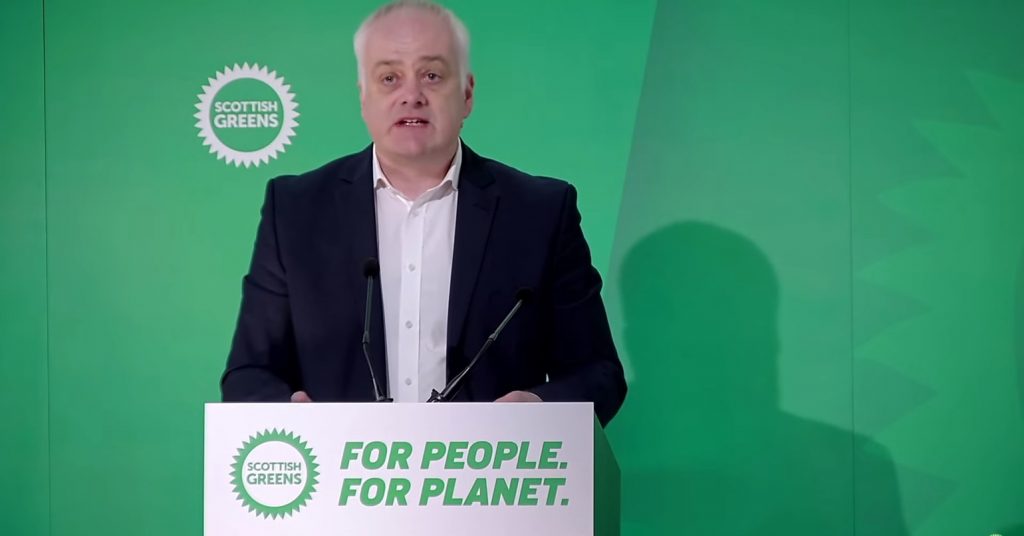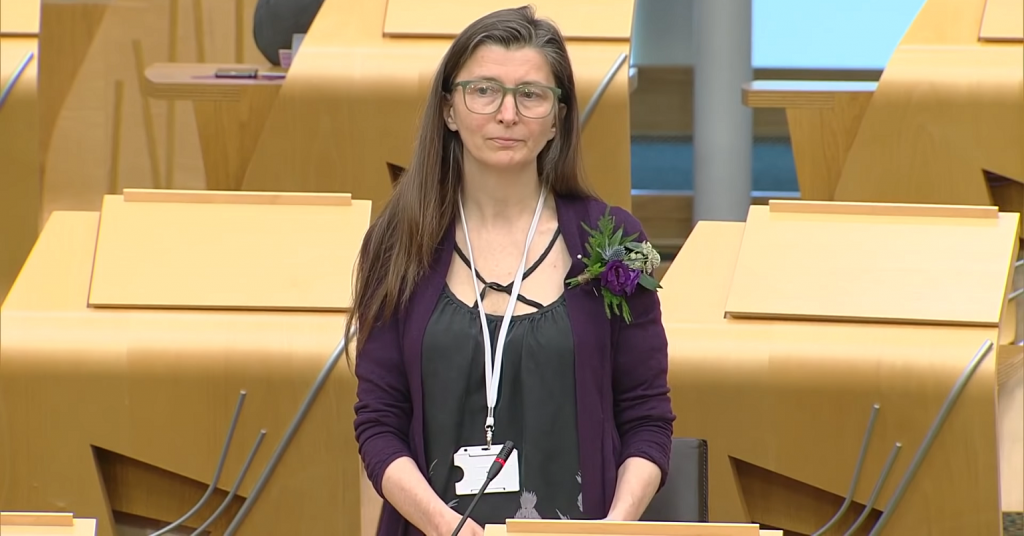Green tactical voting in Glasgow Southside?
This post is by Lallands Peat Worrier.
Jeff Breslin, writing at Better Nation, speculates about the likelihood and utility of Green tactical voting in the upcoming Holyrood election. Glasgow Labour voters are a plum example of the sort of folk Jeff has in mind. Glasgow sees its number of constituencies compressed from nine to eight in the upcoming election. This has implications for the d’Hondt regional calculations, which involve list votes being divided by the number of MSPs presently elected in the region, plus one. Take the example of 2007. The first-past-the-post results in every constituency in Glasgow having been declared, from the get go Labour’s regional list vote was divided by 10 (their nine constituency MSPs +1). In 2011, Labour’s regional votes in Glasgow are likely be divided by nine at least.
What about Nationalists, idly tempted to divide their franchise if they could get away with it? For most in Glasgow, this won’t be a consideration, since the constituencies are dominated by the Labour Party. For most Glaswegian nationalists, voting SNP in the region is the most effective way to return Nationalist representatives. Simpliciter. Not so in my own case, however. Or at least, not necessarily. I’m registered in Glasgow Southside, the constituency whose resketched boundaries replaces the Govan seat won by Nicola Sturgeon by 744 votes in 2007. According to the notional figures, the shuffled electoral frontiers mean that Labour are estimated to enjoy a minuscule majority of 27. Their candidate in 2011 is Baillie Stephen Curran. What of wayward Glaswegian Nationalist supporters here, loosely wondering about the implications of casting their second votes elsewhere? I would at least flirt with the idea of a Green tactical vote for Patrick Harvie, if I thought it wouldn’t impact on the overall strength of Glasgow’s Nationalist contingent. Further investigation seemed warranted. A quick look at the figures suggests that crying It’s Thyme! in Glasgow Southside would be a decidedly risky course of action.
Glasgow hasn’t exactly been a dear Green place where the Scottish Greens have flourished untended, verdant and unbuffetted by the thrawn West Coast elements. Having laid down relatively shallow roots, their plant still clings tenaciously on, embattled. Having taken 4% of the Glasgow regional vote in 1999 (10,159), the Greens’ support increased to 14,570 (7.1%) in 2003 – electing Patrick Harvie for the first time – but fell back to 5.2% and 10,759 votes in 2007. As others have noted, the Scottish Green’s retention of a seat in Glasgow in 2007 was wholly down to Nicola Sturgeon’s victory in Glasgow Govan. I’ve calculated (I hope accurately) the d’Hondt distributions in the Appendices below, comparing the actual result (Table 1) with what would have happened if the Govan campaign had miscarried and Labour had clung on for grim death (Table 2). Briefly, the figures clearly disclose that if Nicola had been defeated by a miraculously resurgent Crackerjack, the Nationalists would have taken the final regional seat, the Greens undershooting to the tune of 408 votes. By contrast, where Nicola wins her constituency, I notice that Nationalists appear only to run only 1,455 votes shy of nabbing a fourth regional seat in Glasgow from the Greens. That said, we must remember that in order to make up that gap, the SNP would have to secure (the difference +1 multiplied by six) to reflect the d’Hondt calculations. On 2007 numbers, the SNP would actually have to secure a stonking 64,551 regional votes, or an increase of 8,718 on their 2007 performance, to deprive the Greens of that last seat.
Given psephological ebbs and flows, and the relativity of political fortunes, it is worth briefly sketching the history of Glasgow regional vote in general terms. In the first Holyrood election of 1999, Glasgow elected four additional SNP members, with no constituency victories for the Nationalists, on 25.5% of the regional ballot and 65,360 votes cast. In 2003, this decreased to two additional SNP members, and no constituencies, with 17.1% of total ballots cast and 34,894 votes. In 2007, we took five – Nicola and four additional members, with 27% of list votes in the region, numbering 55,832. Since devolution, the SNP secured its highest percentage of Glaswegian votes in 2007, but the highest absolute number of votes in 1999. Votes went wandering in 2003, not least to the SSP, who picked up their first list seat in Glasgow in 1999, the ill-fated Tommy Sheridan being elected with 18,581 or 7.2% of the vote. He was joined by Rosie Kane in 2007, when the party’s support increased to 31,216 votes, or 15.2% of the regional total. The Liberal Democrat list vote has been decreasing (just a wee bit) in Glasgow year on election year, from 18,473 (7.2%) to 14,939 (7.5%) to 14,767 (7.2%). Tory figures tell a similar tale. In 1999, they received 20,239 of votes cast in the city (7.9%), decreasing to to 15,299 (7.5%) and most recently to 13,751 (6.7%) in 2007.
On the left, it is interesting to note the extent to which there is unrealised potential for a united socialist platform to break through. If Solidarity’s votes are added those secured by the Scottish Socialist Party in 2007, they totalled some 11,234, actually beating the Greens by 364 votes, kicking them out of that last list seat and – if Nicola had lost Glasgow Govan in 2007 – seizing the seventh additional seat from the SNP, reducing the Nationalists’ overall list tally from four tribunes to three. Even more so if Arthur Scargill’s Socialist Labour vote (support for which ran at 2,680 in 2007) was added. I’m conscious, however, that the socialist left is riven with divisions, even before some account is taken of the venereal and litigious escapades of the Satsuma Socialist. Given this toxic legacy and these divisions, I don’t know whether such a coalition would be sustainable – but the 2007 result suggests that it has the potential to be effective in Glasgow if its support coalesced around a single party.
This presents an even more acute reason to cast one’s second ballot for the SNP. If Nicola loses in Southside but the regional SNP vote stays in broadly similar territory, someone is being knocked off the bottom of the list, ideally Glasgow’s solitary Tory – but potentially a Green, a Liberal – or that fifth SNP MSP, on a bad night. For my part, I’m confident that Nicola can beat Cooncillor Curran in Southside, although the conclusion is not foregone. Such a victory would take much of the pressure off of our Green friends on the list. As a consequence, perhaps the clearest finding in all of this is that it is in the rational self interest of Green voters in Glasgow Southside to support Nicola Sturgeon on their first ballot paper. Is it thyme in Glasgow Southside? Sorry Mr Harvie, but for my part, I haven’t the steel nerves to risk it.
Appendices
Total votes cast
- Labour 78,838
- SNP 55,832
- Libs 14,767
- Con 13,751
- Greens 10,759
- Solidarity 8,544
———————————————–
Round 1
- Labour 78,838 /10 = 7,883.8
- SNP 55,832/2 = 27,916
- Libs 14,767 = 14,767
- Con 13,751 = 13,751
- Greens 10,759 = 10,759
- Solidarity 8,544 = 8,544
SNP MSP elected
———————————————–
Round 2
- Labour 78,838 /10 = 7,883.8
- SNP 55,832/3 = 18,610.67
- Libs 14,767/1 = 14,767
- Con 13,751/1 = 13,751
- Greens 10,759/1 = 10,759
- Solidarity 8,544/1 = 8,544
SNP MSP elected
———————————————–
Round 3
- Labour 78,838 /10 = 7,883.8
- SNP 55,832/4 = 13,958
- Libs 14,767/1 = 14,767
- Con 13,751/1 = 13,751
- Greens 10,759/1 = 10,759
- Solidarity 8,544/1 = 8,544
Liberal MSP elected
———————————————–
Round 4
- Labour 78,838 /10 = 7,883.8
- SNP 55,832/4 = 13,958
- Libs 14,767/2 = 7,383.5
- Con 13,751/1 = 13,751
- Greens 10,759/1 = 10,759
- Solidarity 8,544/1 = 8,544
SNP MSP elected
———————————————–
Round 5
- Labour 78,838 /10 = 7,883.8
- SNP 55,832/5 = 11,166
- Libs 14,767/2 = 7,383.5
- Con 13,751/1 = 13,751
- Greens 10,759/1 = 10,759
- Solidarity 8,544/1 = 8,544
Tory MSP elected
———————————————–
Round 6
- Labour 78,838 /10 = 7,883.8
- SNP 55,832/5 = 11,166
- Libs 14,767/2 = 7,383.5
- Con 13,751/2 = 6875.5
- Greens 10,759/1 = 10,759
- Solidarity 8,544/1 = 8,544
SNP MSP elected
———————————————–
Round 7
- Labour 78,838 /10 = 7,883.8
- SNP 55,832/6 = 9,305.33
- Libs 14,767/2 = 7,383.5
- Con 13,751/2 = 6875.5
- Greens 10,759/1 = 10,759
- Solidarity 8,544/1 = 8,544
Actual Glasgow totals in 2007: 9 Labour members, 5 SNP, 1 Liberal, 1 Tory, 1 Green.
Total votes cast
- Labour 78,838
- SNP 55,832
- Libs 14,767
- Con 13,751
- Greens 10,759
- Solidarity 8,544
———————————————–
Round 1
- Labour 78,838 /11 = 7,167.09
- SNP 55,832 = 55,832
- Libs 14,767 = 14,767
- Con 13,751 = 13,751
- Greens 10,759 = 10,759
- Solidarity 8,544 = 8,544
SNP MSP elected
———————————————–
Round 2
- Labour 78,838 /11 = 7,167.09
- SNP 55,832/2 = 27,916
- Libs 14,767/1 = 14,767
- Con 13,751/1 = 13,751
- Greens 10,759/1 = 10,759
- Solidarity 8,544/1 = 8,544
SNP MSP elected
———————————————–
Round 3
- Labour 78,838 /11 = 7,167.09
- SNP 55,832/3 = 18,610.66
- Libs 14,767/1 = 14,767
- Con 13,751/1 = 13,751
- Greens 10,759/1 = 10,759
- Solidarity 8,544/1 = 8,544
SNP MSP elected
———————————————–
Round 4
- Labour 78,838 /11 = 7,167.09
- SNP 55,832/4 = 13,958
- Libs 14,767 = 14,767
- Con 13,751/1 = 13,751
- Greens 10,759/1 = 10,759
- Solidarity 8,544/1 = 8,544
Liberal MSP elected
———————————————–
Round 5
- Labour 78,838 /11 = 7,167.09
- SNP 55,832/4 = 13,958
- Libs 14,767/2 = 7,383.5
- Con 13,751/1 = 13,751
- Greens 10,759/1 = 10,759
- Solidarity 8,544/1 = 8,544
SNP MSP elected
———————————————–
Round 6
- Labour 78,838 /11 = 7,167.09
- SNP 55,832/5 = 11,166
- Libs 14,767/2 = 7,383.5
- Con 13,751/1 = 13,751
- Greens 10,759/1 = 10,759
- Solidarity 8,544/1 = 8,544
Tory MSP elected
———————————————–
Round 7
- Labour 78,838 /11 = 7,167.09
- SNP 55,832/5 = 11,166
- Libs 14,767/2 = 7,383.5
- Con 13,751/2 = 6875.5
- Greens 10,759/1 = 10,759
- Solidarity 8,544/1 = 8,544




I’ve just designed software programs that is able to efficiently scrape applicable contents
of an issue (or maybe the topic your websites is focused on) through the major search engines for making huge 100% copyscape passed contents.
You might be fascinated to research it?
Further to this, you might be interested in another spot of analysis, conducted on Scotland Office figures from 2008 which give information on how constituency voters used their list ballots in the 2007 election. I wasn’t aware such figures existed, but a helpful commenter drew my attention to them.
http://lallandspeatworrier.blogspot.com/2011/03/more-glasgow-southside-psephology.html
In yon piece, I focus on Glasgow Govan/Southside once again, but the statistics are available across Scotland. Greenies are liable to be particularly interested that the 2007 figure suggest dissatisfied Liberal voters in Glasgow seem more likely to break your way than to the SNP.